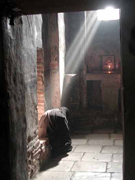Tag: silence

Do Not Neglect Prayer
Living in your cell clearly means manual work, eating only once a day, silence, meditation; but really making progress in the cell means to experience contempt for yourself wherever you go, not to neglect the hours of prayer and to pray secretly. If you happen to have time without manual work, take up prayer and… Read More ›

Our Culture is Geared to Avoid Silence
Now let us frankly face the fact that our culture is one which is geared in many ways to help us evade any need to face this inner, silent self. We live in a state of constant semiattention to the sound of voices, music, traffic, or the generalized noise of what goes on around us… Read More ›

Wrestle with One’s Demons
When they spend time in solitude and in silence, people inevitably have to wrestle with their own demons. Indeed, that very phrase to “wrestle with one’s demons” is derived from the fathers and mothers of the desert tradition. They speak quite literally of the forces of evil that will tempt the solitary monk or nun… Read More ›

On Holy Abandonment
Holy Abandonment, being perfect, loving, and filial conformity with God’s will, can only come from charity. It is indeed the natural fruit of charity, in such sort that a soul so far advanced as to live by love will live also in abandonment. For it is the property of love to unite man intimately with… Read More ›

Reverence before God
What is reverence before God? It is the sobriety of spirit that stems from an experience of the otherness of God which makes us want to subdue self, remain silent, and to submit. We are overwhelmed by the greatness of God present and are reluctant to spoil the occasion by the intrusion of our own… Read More ›

Benedictines: Lovers of the book
[For followers of St. Benedict]. . .Part of their vocation, it seems to me, is to be lovers of the book. Someone absorbed in reading is a beautiful sight, as many great paintings attest. Observing, we become aware of a certain stillness of the body and quietness of mind in the reader, a concentration of… Read More ›

An Invitation to Interiorness
In short, therefore, it can be said that St Benedict’s message is an invitation to interiorness. Man must first of all enter himself, he must know himself deeply, he must discover within himself the aspiration to God and traces of the Absolute. The theocentric and liturgical character of the social reform advocated by St Benedict… Read More ›

Towards Eternal Life
Happiness consists in knowing what you want, and then knowing you have it, or you are on the way to getting it. What we want is God. Our hearts will not rest, until they rest in you, O Lord [1]. Our minds seek infinite truth. Our hearts are made for infinite love. The purpose of… Read More ›

Entertainment becomes necessary when life has lost all meaning
What is the dominant mode of experience at the end of the twentieth century? How do people see things, and how do they expect to see things? The answer is simple. In every field, from business to politics to marketing to education, the dominant mode has become entertainment. . . . In other centuries human… Read More ›

Spirit of Reverence shapes Lectio Divina
Five ways in which the spirit of reverence shapes lectio divina: Reverence propels us toward silence, and silence enables us to listen. Reverence will cause us to surround our reading with safeguards to its seriousness. Reverence for God’s Word means respect for the text of the Bible. . . . It points to a zeal… Read More ›
